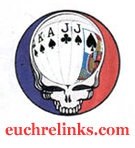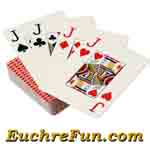
|
| « Games Index | History of Playing Cards | Early Standards | Gallery of Playing Cards | Card Backs |
Cuban Canasta
Canasta is a card game of the Rummy family which first originated in Uruguay in the 1940s and spread rapidly across Latin America, developing into a number of variations according to region including Bolivia, Chile, Mexico and Brazil. This is the version which developed in Cuba.
Number of Players
As it is explained here, Cuban Canasta is card game for four people in two fixed partnerships.
The Cards
Combine two standards decks of playing cards including their four Jokers to give you a deck of 108 cards.
Wild Cards
Within play, all cards from 4 to Ace make up natural cards. Jokers and Deuces (2s) constitute wild cards and are used to substitute for a particular card in order to complete a meld.
Red 3s and Black 3s have special purposes as noted below.
The Deal
Deal and play are clockwise, and the deal proceeds to the left at the end of each hand. Each player is dealt 13 cards one at a time, and the rest of the deck is placed face down in the center of the table to form the stock. The top card is turned face up and placed beside the stock to create the discard pile. If it is a Joker or a Two, one or more additional cards must be turned until a "natural" card appears. And play begins.
The Play
Left of the Dealer goes first, and each player's turn consists of:
- Draws one card from the stock, then
- Melds and / or lays off cards, as many as they so choose
- Discards a card face up to the discard pile to complete their turn.
Objective
The objective of play is to make melds combining three or more cards of the same rank. Sequences are not counted in this game.
Wild cards may be melded as a set of their own in sets of three or more.
A player, at his/her turn may lay down as many melds and cards as they so choose, creating new melds, or adding cards to both their own melds and those of their partner’s. A player may not at any time add cards to their opponent’s melds.
Canastas
A canasta is a meld of seven cards and in Cuban Canasta canastas are limited to a maximum of seven cards – no more. Canastas are of two kinds, natural and mixed. A natural canasta is made up of all natural cards, containing no wild cards and earns the point value of the individual cards it is made up of plus a bonus of 500 points. A mixed canasta is one contain one or more wild cards and earns the point value of the individual cards that make it up, plus a bonus of 300 points. A complete canasta is squared up with a red card on top to indicate a ‘natural’ or a black card on top to indicate a ‘mixed’ canasta.
In addition, wild cards may be melded and a canasta of seven wild cards counts as follows: Seven x 2s = 4000 points; Four Jokers and three x 2s = 3000 Pts; and any other wild canasta = 2000 points.
Red Threes
A player who draws a red 3 from the stock must also lay it face up on the table and draw a replacement from the stock.
A Red 3 has a bonus value of 100 points, two Red 3s a bonus value of 300 pints, three Red 3s 500 points, and 1000 points for all four Red 3s. Note that points for Red 3s can only ever be credited to a partnership if they have melded at least one canasta, otherwise, if they have not melded a canasta, then such points count against that partnership and are counted against them as minus points.
Black Threes
Black 3s cannot be melded during play, but are used to "stop" the discard pile for the opponent to the player's left by discarding it to the discard pile. However, a Black 3 cannot be discarded in the first round around the table.
Black 3s can be melded in sets of three or more only when a player goes out. If he/she holds just one Black 3, he/she can go out by getting rid of it as the discard after they have melded. However, if a player holds two Black 3s they cannot go out, because they won't be able to get rid of them when they go and thereby still have cards in their hand.
A Black 3 melded counts as 5 points, and if the partnership meld all four Black 3s they count as 100 points. Any Black 3s held in hand counts as -100 points each against them.
Initial Meld Minimum
The initial meld minimum only applies when a partnership’s score is 5000 points or more and is set at 150 points. After a side has made its initial meld, either partner my make any valid meld without reference to the minimum count.
Taking the Discard Pile
The discard pile can only be taken by matching the top card with a natural pair held in the hand. But not, as is the case in Canasta, by matching it with any cards already laid out on the table in existing melds.
The discard pile may never be taken when its top card is a wild card or a black 3. In this case the discard pile is stopped.
If the discard pile taken contains any Black 3s, they are set aside, and are no longer in play. Each black three taken in this way counts five points, or 100 points for all four.
To take the discard pile the procedure is as follows:
- Before touching the discard pile, the player should show their natural the pair and then;
- Meld the top card with the natural pair;
- and then take up the entire discard pile, melding and laying off as they so please;
- And then discarding one card to complete their turn.
The Discard Pile may not be Taken:
The discard pile may not be taken by a partnership that has not yet made a meld. The discard pile may not be taken if it is topped by a wild card or a Black 3. A player with only one card left in his hand may not take the discard pile if there is only one card in it.
Going Out
A player goes out when he gets rid of the last card in his hand by discarding or melding it, provided that their side has melded at least one canasta or he completes a canasta while going out. Failing this requirement, he must keep at least one card in his hand. When a player goes out, the hand ends and the results on both sides are scored.
A player need not make a discard in going out; he/she may meld all of his remaining cards
Permission to Go Out
If a player sees that he/she is able to go out, before or after drawing, the player may ask their partner who must answer “yes” or “no”, and the answer is binding. However, the player may go out without asking permission.
Exhausting the Stock
If no one has gone out by the time the last card is drawn from the stock then each player in turn takes the discard of the previous player in turn, and must do so, so long as it matches a meld of his partnership; or may choose to take such a discard if he can use it to form a new meld – but does not have to take it. Play ends when either a player cannot take up the discard, or the player legally refuses to do so.
Note, that if the last card of the stock happens to be a Red 3, the player reveals it. In this case, the player may not meld or discard. Play simply ends.
Scoring a Deal
At the end of the hand, each partnership tallies their score by scoring both for all their melds, plus the face value of the individual cards making up the melds, and minus any cards left in hand. Each Black 3 in hand counts -100 points.
|
|
||||||||||||||||||||||||||||||||||
Game
Cuban Canasta is played over several hands to a grand total of 7500 points. If both teams are over 7500 points at the end of a hand, the team with the higher score wins the game.
L I N K S
How to play Canasta - Cats at Cards
Cuban Canasta Rules - Rummy Games Rules
Canasta - Card Games Heaven
Rules for Canasta - Card Games Website
Canasta: History and Rules - Australian Card Games
| Complete Index of Card Games » |
|||||||||||||||
|
|||||||||||||||
|
|||||||||||||||
| |||||||||||||||
| |||||||||||||||
|
|||||||||||||||
| |||||||||||||||
|
|||||||||||||||
| |||||||||||||||
|
|||||||||||||||
| Complete Index of Card Games » |


| « Games Index | History of Playing Cards | Early Standards | Gallery of Playing Cards | Card Backs |

|
|
|